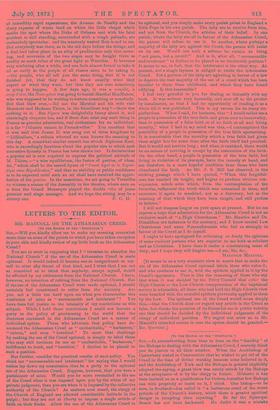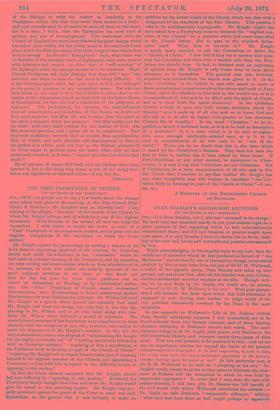[TO THE EDITOR Or Till SPZOTITON.1 Sin, —In animadverting from
time to time on the " timidity " of the Bishops in dealing with the Athanasian Creed, I scarcely think you do justice to all their number. When the Archbishop of Canterbury stated in Convocation that he wished to get rid of the Creed in the time of divine worship because none believed in it, and the Archbishop of York and the Bishops in general implicitly adopted the saying, a great blow was surely struck by the Bishops at the acceptance of it by the clergy in future. Hitherto it has been insisted on as a qualification for Orders, hereafter few Bishops can with propriety so insist on it, I think. One bishop—to be sure, in Scotland—has called it "a barbarous creed of the worst periods of the Church's history, which there is greater spiritual danger in accepting than rejecting." So far the Episcopal Bench has not been backward. No doubt it was a mistake of the Bishops to refer the matter so implicitly to the Presbyters, ankin this that they erred there cannot be a doubt ; and your remarks may be of service to some of them on this score, for it is here, I think, that the Episcopate has most need of caution, and also of encouragement. Few conversant with the Church of England but must have observed the great change which has taken place within the last thirty years in the relatively lower place which the Bishops occupy with their clergy to that which they used to occupy. In the old " Evangelical " days, when there was no doctrine of the intrinsic merit of Episcopacy, they were treated with deference and respect ; in these days of " will-worship " of the Episcopal order, the strange reverse is to be observed. High- Church Presbyters ask their Bishops how they will face" this and that, and desire to have the last word in every difficulty. It is the Christian spirit which has gone from it, if it ever belonged to the party in question in any evangelical sense. For who can• have failed to see—and it is to this I desire to come—that in the matter of the Athauasian Creed, as dealt with by the Lower House of Convocation, we have had but a repetition of the judgment of Solomon? The professional, the nervous, the semi-informed were all conservative, and in defence of the Creed, we doubt not from good motives ; but after all, was it other than the spirit of the above judgment which was present ? Did they really care for the child ; were they really anxious for the honour of God ; was His character precious, and it above all to be considered ? Had they such confidence towards God as results from apprehending Him in Christ, and such absolute self-abandonment to Him in the perfect love which casts out fear as the faintest glimmer of the Cross ought to produce upon the heart, when they on that memorable occasion, as it were, "leaped upon the altar which they made ?"
By all manner of means find fault with the Bishops when they deserve it, but in this thing they alone, as yet, of the clergy have taken any significant or forward action.—I am, Sir, &c., PRELATES.



































 Previous page
Previous page